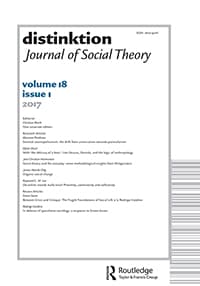 Umschlag
UmschlagCritique as a Practice of Prefigurative Emancipation
In Distinktion 18.2 (2017), 196–214. 2017Zusammenfassung
Although the various interpretations of Foucault’s model of critique often seem to differ only in minor details, they seriously diverge by situating critique on different levels of abstraction in Foucault’s work. Mapping interpretations of Foucault’s critique according to this criterion shows that none of them pays full attention to all three of Foucault’s methodological imperatives which he calls nihilism, nominalism and historicism. The article offers such a reading of Foucault’s critique, interpreting it as a diagnostic practice of prefigurative emancipation. The task of diagnosing the present explains how Foucault’s critique functions as a philosophical practice, and by making explicit in which ways it emancipates us, it gives us reasons why we might be interested in doing critique like that.